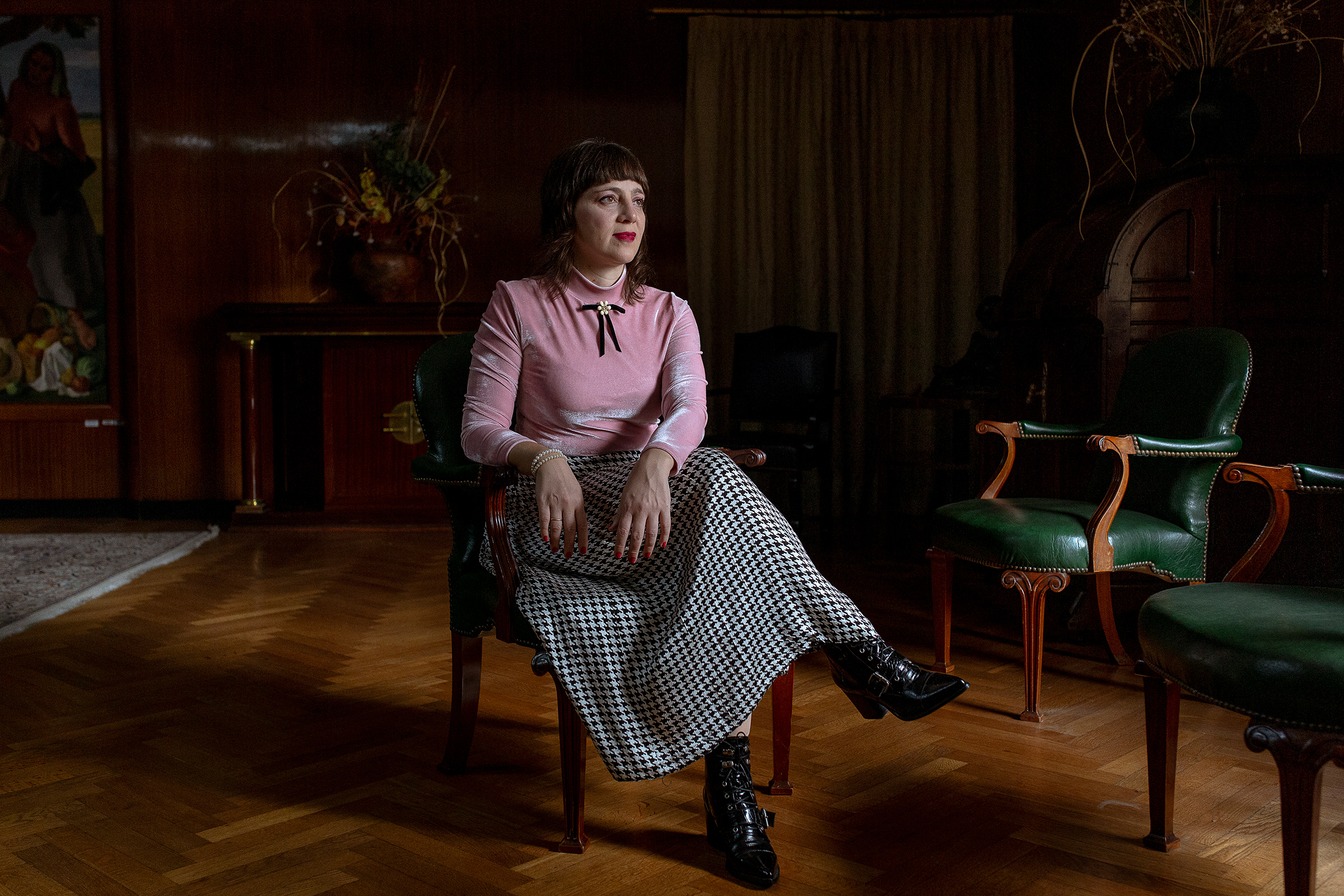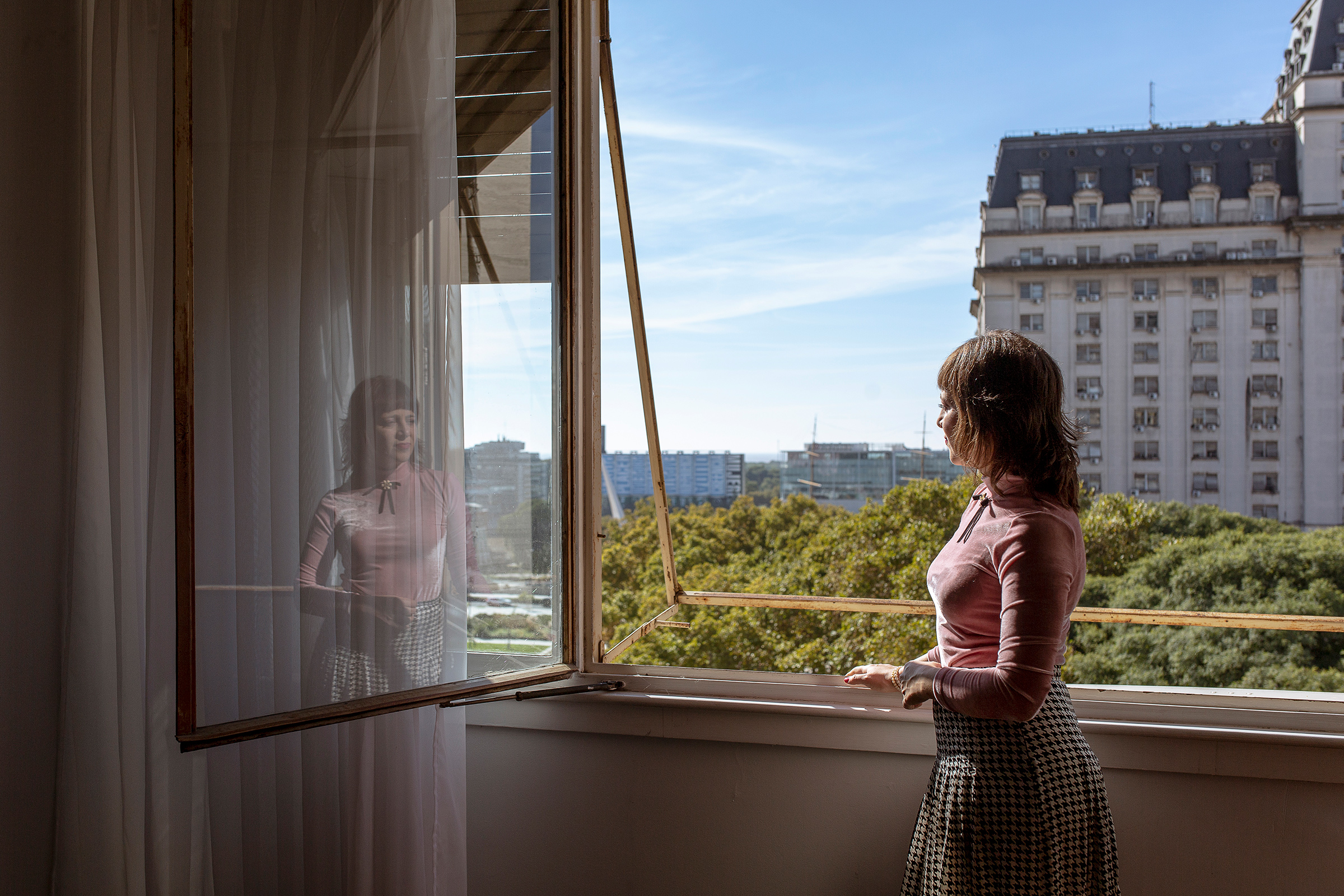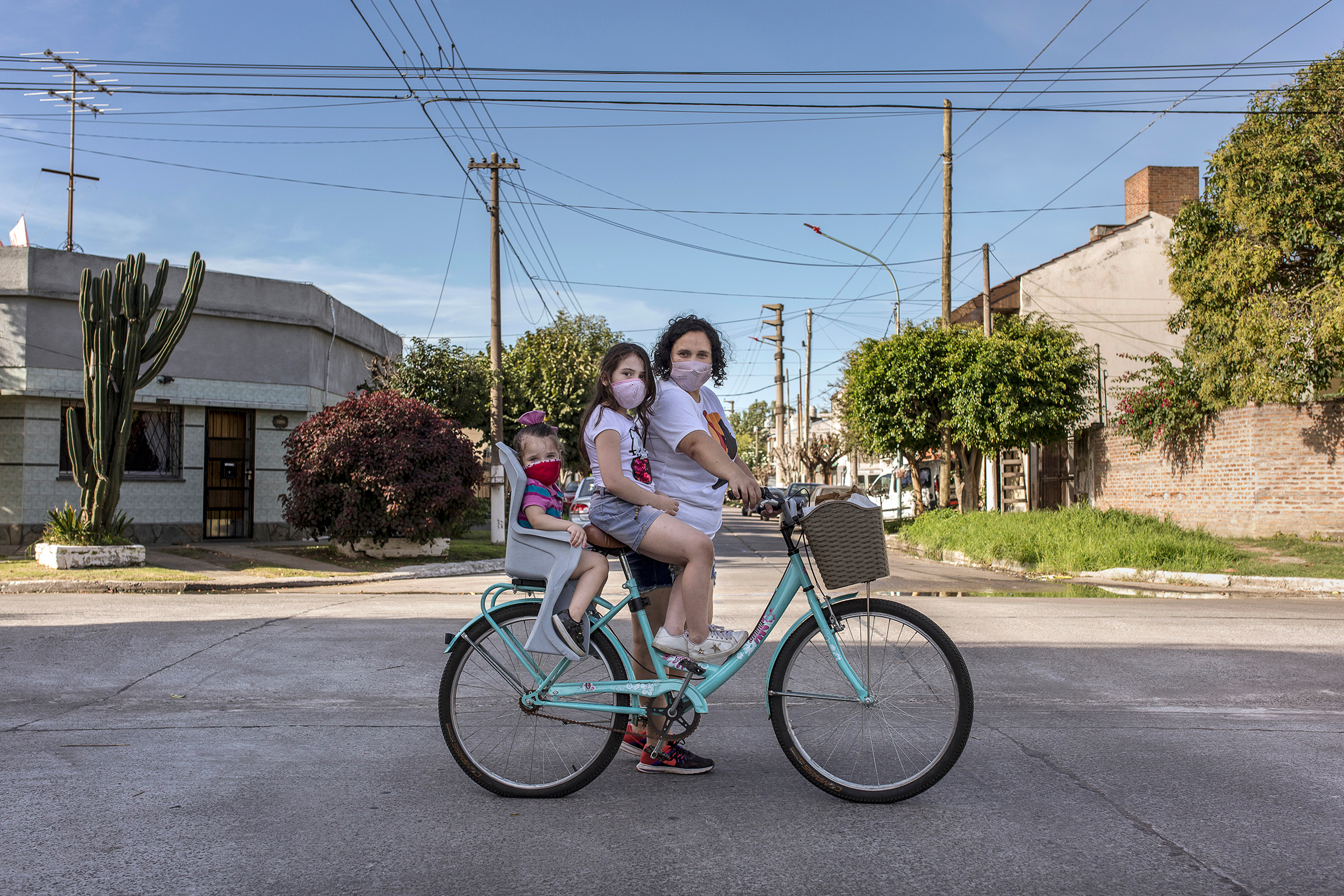Early in the COVID-19 pandemic, María Teresa Arzamendia began working night shifts. The 40-year-old says she had been employed by the owners of a gluten-free bakery in western Buenos Aires for four years, three of them off the books. Her employer’s flexibility allowed her and her partner to divide caring for their daughters, then ages 2 and 7, while schools were closed. For the first month or so, they got by.
But in April 2020, the couple split up, complicating childcare. And then, in August, Arzamendia was laid off when the bakery closed due to the pandemic. It reopened a month later, but she wasn’t hired back. She claims her employer indicated it was because of her need for flexibility around childcare, and that only female employees were let go. “Women in Argentina tend to take care of everything at home and with the kids,” says Arzamendia. “In the past year, if you’re a woman and you have children, you just don’t fit into the labor market.” She is suing the bakery owners for keeping her employment off the books. (The bakery’s owner told TIME that Arzamendia had never been employed at their current business and had last worked for them at a different bakery that closed in 2019.)
Read More: These Mothers Wanted to Care for Their Kids and Keep Their Jobs. Now They’re Suing After Being Fired
Arzamendia has since spent the past few months bicycling around her neighborhood selling homemade bread and medialunas—Argentina’s croissant-like pastries—and then selling baby clothes and men’s underwear over the Internet. Her daughters remain out of school. “I’m still sending out résumés. But when they know I have kids, they don’t want to hire me. I just feel so outside of everything,” she says.
Millions of women around the world have felt similarly excluded from the economy over the past year. COVID-19 restrictions have simultaneously increased the burden of unpaid labor on women—with school closures forcing millions to leave jobs to take care of children—and decimated the hospitality, retail and care-work industries that are often the main employers for women. By the end of 2020, women’s labor-force participation across Latin America had fallen to 46%, from 52% at the end of 2019, a record single-year drop, as 13 million women lost their jobs. Globally, women lost twice as many jobs because of COVID-19 than men, according to estimates by McKinsey. In the U.S. in March, women’s labor-force participation had fallen to 57.4%, a level not seen since 1988. As the economy has rebounded from troughs of spring 2020, jobs have returned more slowly for women of color, with 10% fewer Black women and 9% fewer Hispanic and Latino women employed now than pre-pandemic, compared to 5% fewer white women. The World Economic Forum concluded in a March report that the pandemic had added 36 years to the estimated time it will take to close the global gender gap, meaning it will now take an average of 135.6 years to reach parity between women and men on economic opportunity, political power, education and health.
Now, as the global rollout of COVID-19 vaccines picks up pace, governments worldwide are deploying resources to boost their economies. Many are taking into account the immediate impact of the pandemic on gender equality, but some are also considering a bigger paradigm shift, focusing their attention on the structural challenges that have allowed women’s labor participation to stagnate over the last three decades and kept them out of higher paid jobs. Jennifer Klein, co-chair of the White House Gender Policy Council established by President Joe Biden on March 8, says the lessons of the pandemic are remaking American norms around care work and women’s labor. “It’s not so much an opportunity, it’s a demand: this moment demands a big structural change.”
Klein is not alone in that ambition. In Canada, Chrystia Freeland, the country’s first female finance minister, has set up an all-women task force to make sure the 2021 budget, due later this spring, is targeted to spark a “feminist and intersectional recovery.” In Colombia, the government launched a fund in June to support women entrepreneurs and set up a digital entrepreneurship training program to teach 30,000 women to conduct business online. In Morocco, the government launched a digital platform in May for women’s farming collectives to sell their products online. Governments in Guatemala, Egypt and Georgia are also prioritizing women-led businesses as they try to stimulate the economy in the wake of the pandemic.
But it is Argentina that has rolled out out more gender-sensitive COVID-response measures than any other country, according to the U.N. That’s thanks partly to Mercedes D’Alessandro, the nation’s first director of economy, equality and gender. Argentina’s economy, long trapped in a cycle of dysfunction, was struggling even before the pandemic, and shrank by nearly 10% in 2020. Despite the challenges, D’Alessandro is pushing to use government recovery efforts to make the economy work better for women like Arzamendia: expanding care infrastructure; getting more women into male-dominated industries and vice versa; adding more flexibility for parents to work remotely.
The case for better incorporating women into the economy is clear: analysts at McKinsey say doing so would increase global GDP in 2030 by $13 trillion. For D’Alessandro, there’s also a moral element: after a year that has underscored how essential women’s labor is to the economy—from unpaid care work to frontline health care roles—she says governments owe it to women. “Without all the work that women did this year, there’d be no economy to rebuild.”

This was always something of a dream job for D’Alessandro, who grew up in Argentina. Before she was invited to become the country’s first gender director inside the economy ministry in January 2020, she’d spent five years critiquing the patriarchal structure of the Argentine and global economies through the media outlet she founded and edited from New York, Economía Femini(s)ta. “I had talked about a role like that, but like you talk with your friends over beers—completely hypothetical,” the 43-year-old says. “When it actually happened, I couldn’t really say no.” She packed up her apartment in New York and moved back to Buenos Aires, full of optimism.
But weeks into her new job, the coronavirus tore through Latin America, prompting Argentina to implement one of the world’s longest continuous lockdowns. (Measures were only eased for a significant period in November.) D’Alessandro found herself on the front line of the most dispiriting moment for gender equality in the economy in decades.
The numbers are startling. By the end of 2021, the U.N. predicts that up to 47 million more women and girls will have fallen into extreme poverty— a jump of 9% from 2019. In developing countries, according to a March survey of female entrepreneurs, nearly 4 in 10 reported that their businesses had closed or may close as a result of the pandemic. In Southeast Asia and the Pacific, girls are facing increased pressure to take part in forced marriages, and some 1.2 million girls may drop out of school as a result of COVID-19 according to an Australian NGO. In India, where just 10% of women considered themselves part of the workforce before 2020, the proportion had fallen to 7% by November. In the U.S., 2 million women said in September that they are considering taking a leave of absence or exiting the workforce for good; women in upper-management roles are 50% more likely than men to consider cutting back on their responsibilities, largely because of burnout during the pandemic.
Read More: The Coronavirus Pandemic’s Outsized Effect on Women’s Mental Health Around the World
Plenty of governments are acting to prop up their crumbling economies, yet according to a March 18 U.N. analysis, only about 12% of the fiscal and economic measures they’ve taken are “gender sensitive,” meaning they contribute directly to women’s economic security. In the short term, the most powerful tool for stemming the impact on women has been direct cash transfers, says Raquel Lagunas, director of the U.N. Development Programme’s gender team. In Brazil, single mothers working in the informal sector or living in low-income households received greater emergency transfers of cash every month from the government. In India, authorities transferred 200 million vulnerable women 500 rupees ($6.50) a month from April to June last year.
Even where programs that are not gender-based—like the U.S. government’s direct transfer of $1,400 to all Americans meeting certain financial criteria—their impact on women is usually greater, because globally women are 25% more likely to be in extreme poverty, less likely to have a job and more likely to be caring for children alone. But the U.N. is calling for developing countries to go further and deploy a temporary monthly payment of 50% of local average income specifically for women. For 132 developing countries studied, it would cost on average 0.07% of GDP to give the income to women experiencing severe socio-economic stress, or 0.31% of GDP to give it to every working-age woman. “By targeting women, you are ensuring they have financial autonomy and correcting an imbalance of power in relationships,” Lagunas says. “When women can make decisions about money, usually they invest it in their kids in education, in repairing the house, in improving their small businesses.”
In her new role, D’Alessandro has pressed department heads to make sure their spending takes women into account. In September, the government published the country’s first budget with a gender perspective, with 15.2% of public spending going toward programs that target gender inequality.
D’Alessandro persuaded ministers to include all domestic workers—97% of whom are women—regardless of their employment status, and stay-at-home parents in the country’s emergency cash distribution of three $108 payments, ahead of its rollout in April 2020. “We had to work to show them they had a right to receive it because sometimes a woman working all day in her house with her kids won’t think she is doing an economically important activity. But she is,” D’Alessandro says. A separate program was launched to guarantee a minimum wage for six months to women who are fleeing domestic violence, which advocates say has surged during the pandemic as women are confined to their homes with abusers. The U.N. called the government’s emergency response “exemplary” in the region.
Arzamendia was one of the recipients of emergency cash transfers, along with a child benefit and monthly food parcels for unemployed parents. She used some of the cash to buy ingredients to start her own baking business, taking her daughters out with her to sell the goods. (Things got a little easier when she and her partner got back together in February, she says.) “I’m lucky because I’ve worked all my life,” she says. “But it’s harder for lots of women who’ve never invested in their own business or worked like that.”
It’s not enough for governments to give women cash to cushion the blow of the pandemic with one hand, D’Alessandro says, if with the other they are rebuilding the labor market that made them vulnerable in the first place. In Argentina, authorities plan to prioritize industries such as construction, manufacturing, energy and technology, which are seen as efficient at generating jobs. “All of these sectors are extremely masculinized,” D’Alessandro points out. In Argentina, women hold fewer than one in 10 jobs in construction and computer programming, and around one in five in industry. “So women aren’t in the sectors that we’re thinking about when we think about economic recovery.”
To address this, Argentina has launched employment programs for vulnerable people who have struggled to enter the labor market—providing them with monthly payments, help accessing jobs, and grants for training and education. A law passed in October offers fiscal and tax incentives to tech companies that hire women and LGBTQ+ people. The public-works ministry has announced it will give priority in financing to construction projects that have gender parity in their hiring.
But though women’s rights advocates welcome such efforts by Argentina and other countries, many say the pandemic has highlighted more deeply entrenched structural problems holding women back. Although women’s participation in the workforce surged throughout the 20th century, it has hit a wall. The percentage of women who were part of the world’s labor force fell from 51.5% in 1992 to to 48.7% in 2017, according to the World Bank.
Alicia Bárcena, executive secretary of the Economic Commission on Latin America, says the pandemic has forced the public, policymakers and employers to wake up to the gender inequality that devalues caregiving and domestic work, and to acknowledge “that women are historically the great carers of society.” “We are betting on a paradigm shift,” she says.

In September, D’Alessandro’s office published a report estimating the value of unpaid domestic work to the economy, if it were paid, to be 16% of GDP—more than any other sector. She hopes that will start to impress upon the government and society that care work is part of the economy and needs state support. Some early wins have already taken place: the 2021 budget included a plan for 300 new public childcare centers in the country’s poorest neighborhoods by the end of 2022. A law coming into effect in April entitles remote workers to flexible hours if they are caring for children under 13, people with disabilities, or elderly people who require support.
Policymakers elsewhere show limited signs of revaluing caregiving. Colombia, Brazil, Chile and Mexico have launched programs to measure the amount of time women spend on care work. In India, major political parties have proposed paying women for doing housework in the run up to elections in states including Tamil Nadu, and West Bengal, prompting unprecedented debate around the division of labor.
COVID-19 has even forced the conversation among Americans, who have historically seen caregiving as “a private responsibility, one that you almost couldn’t even talk about at work,” says Klein, of the White House gender council. “And it’s beginning to be seen as a public responsibility,” Klein says. “That’s a huge sea change.”
The pandemic has already triggered one crucial—if temporary—transformation in the U.S. The $1.9 trillion stimulus bill passed in March raises the child-tax credit from a maximum of $2,000 to $3,000 for each child under 18, and $3,600 for children under 6 for 2021. Unlike previous versions of the benefit that were given as a lump sum in annual tax refunds, the cash will be delivered monthly, directly to parents’ bank accounts and will include families who don’t have an income. Experts say that will cut child poverty rates by 40% in 2021.
Klein says she “thinks and hopes” that the experience of the pandemic will also bring the U.S. closer to paid family leave. (It is the only one of 41 mostly wealthy countries in the Organisation for Economic Co-operation and Development and the E.U. that offers no paid maternity leave.) President Biden’s campaign pledges included a $775 billion package to overhaul caregiving in the U.S. over the next 10 years by, among other things, facilitating access to affordable childcare, building day-care centers, and expanding home and community care options for the elderly.
A challenge to bring about these changes is ensuring they do not rely upon low-paid labor of women of color, who often are the ones providing care for other families. Khara Jabola-Carolus, the director of Hawaii’s commission on the status of women. In April 2020, she published a feminist recovery plan for the state, co-written with community activists. Jabola-Carolus grew up seeing how filling the American care gap “ripped families apart, on a mass scale” with Filipina women not seeing their children for a decade as they looked after American children.
“For us, adding support so that women can basically attain the same privileges as white American men in the workplace is not the goal,” she says. So the feminist recovery plan, now adopted by four of five of Hawaii’s counties, calls for the state to use federal relief funds to move away from an economy rooted in tourism and the military, which critics say enables exploitation of local people, and into industries such as research and agriculture. It also demands that the voices of women, Native Hawaiians and Pacific Islanders be given greater sway as local governments decide how to rebuild from the pandemic. “We don’t want a feminist recovery that doesn’t truly move us away from patriarchal-based systems, like capitalism,” Jabola-Carolus says.
While a transition away from capitalism feels unlikely in most countries, D’Alessandro says the pandemic may have sown the seeds of a major transformation for women in the economy, if advocates can stay energized. Next on her to-do list is to push for an expansion of state-mandated paternity leave, which is currently only 48 hours, compared to three months for women. She expects to see the share of Argentina’s budget that accounts for gender grow fast over the next few years. “What we’ve done so far is little,” D’Alessandro says. “But this period has allowed us to reflect and build the tools and information that we need to transform what we mean when we talk about the economy. Now we need to pick them up and start working hard on the future.”
—With reporting by Madeline Roache/London
More Must-Reads From TIME
- What Student Photojournalists Saw at the Campus Protests
- How Far Trump Would Go
- Why Maternity Care Is Underpaid
- Saving Seconds Is Better Than Hours
- Welcome to the Golden Age of Ryan Gosling
- Scientists Are Finding Out Just How Toxic Your Stuff Is
- The 100 Most Influential People of 2024
- Want Weekly Recs on What to Watch, Read, and More? Sign Up for Worth Your Time
Write to Ciara Nugent at ciara.nugent@time.com
